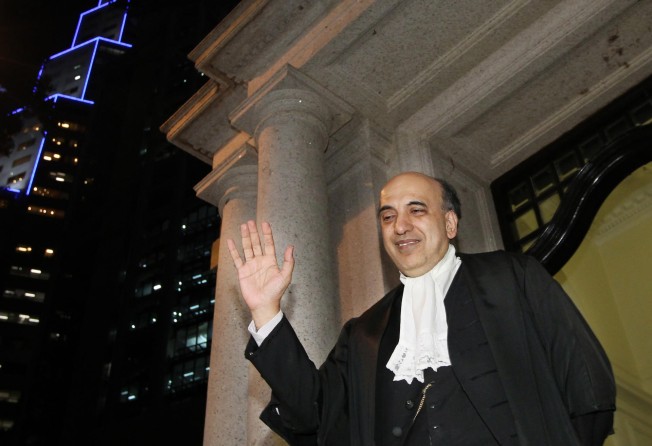Liberal judge Bokhary stands by his dissenting views
Bokhary insists reinterpretation of the right of abode was 'most unfortunate' for the rule of law

One of Hong Kong's best-known judges, who believes he was obliged to accept retirement because of his liberal views, yesterday again warned of the threat to the city's rule of law if judicial decisions were overturned outside the courts.
Mr Justice Kemal Bokhary, a former permanent judge of the Court of Final Appeal, warned of threats to the judiciary's independence, when he retired in October, and yesterday confirmed that he was referring to comments made by former secretary for justice Elsie Leung Oi-sie.
When he spoke publicly of "storm clouds of unprecedented ferocity" gathering over the courts, Bokhary yesterday told the South China Morning Post in written reply to questions that he had Leung's comments in mind.
Leung, vice-chairwoman of the Basic Law Committee, has also criticised the legal profession, including judges, for failing to understand the cross-border relationship with the mainland which she said had led the top court to err in past rulings. She did not specify any cases in her criticism.
Bokhary, who is known for his liberal stance, also referred to the Court of Final Appeal's landmark right-to-abode judgment in 1999 that was reinterpreted by Beijing.
That year, the top court ruled that people born on the mainland to a permanent Hong Kong resident qualified for the right of abode. But the National People's Congress overturned key parts of that ruling in a reinterpretation of the Basic Law sought by the Hong Kong government.
Bokhary said he considered the outcome "most unfortunate for the rule of law".
"Although I considered resigning, I decided that it would be better to remain and see the law through its difficulty," he said.
Bokhary also described how he felt when the whistle-blowing website WikiLeaks disclosed US diplomatic cables that reported his conversation with a US diplomat in which he had said that all five judges at the top court had contemplated resigning.
"The leak about me did not bother me at all. It was not really a private dialogue. I was speaking to make the point that while there was a problem, I believed that we could cope with it, which is why I remained in [my] post," he said.
The "one country, two systems" principle, in regard to the law, meant "above all, maintaining the rule of law and human rights", he said.
A British national, Bokhary disagreed with the suggestion that judges of the top court should be Chinese citizens or Hong Kong residents.
"I do not know what lies behind the suggestion," he said. "It is a suggestion with which I do not agree. The overseas judges have made an extremely valuable contribution. They have no 'anti-government' leanings.
"My nationality is British. That does not make me any less a Hong Kong person," the Hong Kong-born judge said.
He cited the example of Anthony Mason, who became a non-permanent judge of the top court during the 2003 outbreak of severe acute respiratory syndrome although he was told expressly by the chief justice that he could stay away.
Asked about being viewed as a "dissident judge", Bokhary said "dissent paves the way for the future progress of the law. Some of the greatest developments in the law have followed dissents and vindicated them. For the sake of the persons involved in the case, one wishes that one's wishes had prevailed from the start - but if not today, then tomorrow or the day after. The law lives on to become more just."
He added: "Open justice and access to justice are features of any good system. Like the oxygen we breathe, their absence (if absent) is more noticeable than their presence."
Bokhary also referred to his personal life, saying his wife of 35 years, Mrs Justice Verina Bokhary, who primarily sits as a criminal judge in the Court of First Instance, "is perfect and overlooks my imperfections".
After his retirement Bokhary is now a non-permanent judge of the Court of Final Appeal, hearing cases only occasionally.